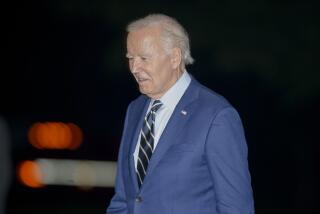Biden seeks to nurture Mideast talks
Reporting from Amman, Jordan — Vice President Joe Biden, winding up a disconcerting trip to the Middle East, struggled Thursday to keep hopes alive for new peace talks amid Palestinian anger over Israeli plans for new housing construction in a disputed Jerusalem neighborhood.
Despite earlier pledges to take part in talks scheduled to begin next week, Palestinian officials threatened to stay away unless Israel abandons announced plans for a 1,600-unit project in East Jerusalem.
Palestinians pressed for the United States to persuade Israel to change its stance on the project. Although the Americans voiced unhappiness with Israel, they also praised an Israeli government apology that voiced regret over the timing of the announcement but did not cancel the plan.
Saeb Erekat, the chief Palestinian negotiator, said on Voice of Palestine radio that Palestinian Authority President Mahmoud Abbas would not take part in upcoming talks unless Israel drops the construction project.
However, Erekat was quoted by other news organizations later Thursday as saying that Abbas was not setting conditions for Palestinian participation, although he hoped the United States would persuade the Israelis to halt the building project.
The statements came as Biden lobbied leaders of both sides in a bid to rescue the talks. He had a midday phone call with Abbas and also spoke with Israeli Prime Minister Benjamin Netanyahu.
In Washington, other U.S. officials contacted leaders throughout the Middle East in a tandem effort to salvage the talks.
American officials said they still expect the Palestinians to take part in the negotiations.
Nonetheless, the uncertainty suggests just how much the peace effort lost ground this week during Biden’s visit to Israel and the West Bank to mobilize both sides to begin indirect talks after a yearlong interruption.
The flap began Tuesday when Israeli officials said they intended to build the housing for religious Israelis in a subdivision called Ramat Shlomo.
Biden, embarrassed and angered, criticized Israel in unusually strong language for two straight days, as he met with Israeli officials and then top Palestinian leaders.
The incident seemed to further shake already weak Palestinian support for the new talks. Israelis have shown little enthusiasm for the planned indirect talks, which would be mediated by the United States. They would prefer face-to-face negotiations.
Palestinians broke off direct talks in December 2008 at the time of Israel’s offensive against the Gaza Strip. Abbas recently gained support from other Arab countries for a return to negotiations, even though Israel has not fully halted controversial construction.
Erekat said in his radio interview that he expects U.S. envoy George J. Mitchell to say when he returns to the region next week whether U.S. officials have succeeded in persuading Israel to abandon plans for the new construction.
The Palestinian spokesman said Abbas told Biden that “the U.S. administration should work to cancel the Israeli decision on settlements” and that “it will be difficult for him to return to the negotiations before canceling that decision.”
“If Israel insists on these settlement activities, then it alone will be responsible for sabotaging efforts by the international community to achieve peace,” Erekat said.
In a speech at Tel Aviv University, Biden called on both sides to undertake further peace efforts, saying the current situation can only become more difficult.
“The status quo is unsustainable,” Biden said.
Biden hailed a statement by Netanyahu suggesting that the Ramat Shlomo project would take so long to build that the issue might be mooted by the completion of negotiations over control of Jerusalem.
Netanyahu said remaining approvals for the project “will in all likelihood take more than a year and the beginning of actual construction would likely take several years.”
But Israel’s position is that construction in East Jerusalem is legal and proper, and Netanyahu didn’t imply that he disapproved of the construction.
The Israeli leader instructed other government officials to avoid disruptive announcements of construction projects such as the one unveiled Tuesday. He said he had personally “expressed his displeasure” to the Israeli interior minister. Biden flew to Amman, the Jordanian capital, Thursday afternoon to consult with King Abdullah II on peace talks and other issues before returning to Washington on Friday.
Special correspondent Maher Abukhater in Ramallah, West Bank, contributed to this report.
More to Read
Sign up for Essential California
The most important California stories and recommendations in your inbox every morning.
You may occasionally receive promotional content from the Los Angeles Times.











